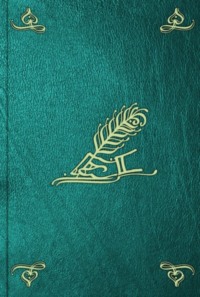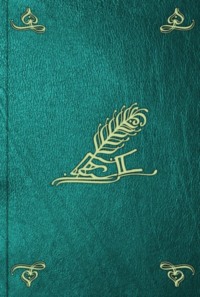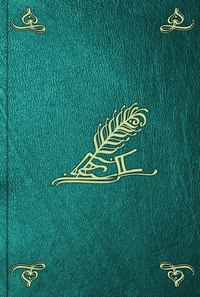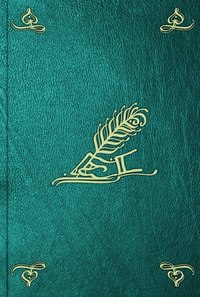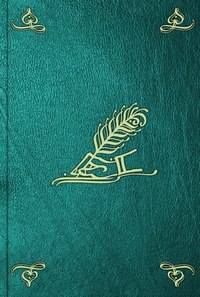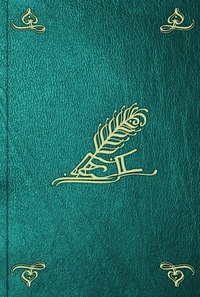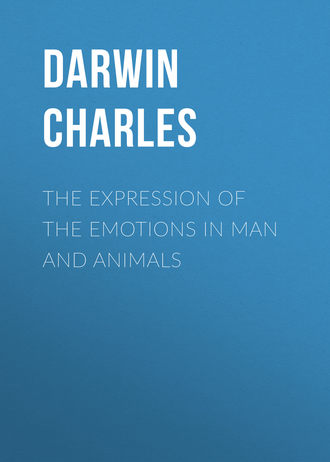 полная версия
полная версияThe Expression of the Emotions in Man and Animals
A sensitive nerve when irritated transmits some influence to the nerve-cell, whence it proceeds; and this transmits its influence, first to the corresponding nerve-cell on the opposite side of the body, and then upwards and downwards along the cerebro-spinal column to other nerve-cells, to a greater or less extent, according to the strength of the excitement; so that, ultimately, the whole nervous system maybe affected.[305] This involuntary transmission of nerve-force may or may not be accompanied by consciousness. Why the irritation of a nerve-cell should generate or liberate nerve-force is not known; but that this is the case seems to be the conclusion arrived at by all the greatest physiologists, such as Muller, Virchow, Bernard, &c.[306] As Mr. Herbert Spencer remarks, it may be received as an "unquestionable truth that, at any moment, the existing quantity of liberated nerve-force, which in an inscrutable way produces in us the state we call feeling, MUST expend itself in some direction – MUST generate an equivalent manifestation of force somewhere;" so that, when the cerebro-spinal system is highly excited and nerve-force is liberated in excess, it may be expended in intense sensations, active thought, violent movements, or increased activity of the glands.[307] Mr. Spencer further maintains that an "overflow of nerve-force, undirected by any motive, will manifestly take the most habitual routes; and, if these do not suffice, will next overflow into the less habitual ones." Consequently the facial and respiratory muscles, which are the most used, will be apt to be first brought into action; then those of the upper extremities, next those of the lower, and finally those of the whole body.[308]
An emotion may be very strong, but it will have little tendency to induce movements of any kind, if it has not commonly led to voluntary action for its relief or gratification; and when movements are excited, their nature is, to a large extent, determined by those which have often and voluntarily been performed for some definite end under the same emotion. Great pain urges all animals, and has urged them during endless generations, to make the most violent and diversified efforts to escape from the cause of suffering. Even when a limb or other separate part of the body is hurt, we often see a tendency to shake it, as if to shake off the cause, though this may obviously be impossible. Thus a habit of exerting with the utmost force all the muscles will have been established, whenever great suffering is experienced. As the muscles of the chest and vocal organs are habitually used, these will be particularly liable to be acted on, and loud, harsh screams or cries will be uttered. But the advantage derived from outcries has here probably come into play in an important manner; for the young of most animals, when in distress or danger, call loudly to their parents for aid, as do the members of the same community for mutual aid.
Another principle, namely, the internal consciousness that the power or capacity of the nervous system is limited, will have strengthened, though in a subordinate degree, the tendency to violent action under extreme suffering. A man cannot think deeply and exert his utmost muscular force. As Hippocrates long ago observed, if two pains are felt at the same time, the severer one dulls the other. Martyrs, in the ecstasy of their religious fervour have often, as it would appear, been insensible to the most horrid tortures. Sailors who are going to be flogged sometimes take a piece of lead into their mouths, in order to bite it with their utmost force, and thus to bear the pain. Parturient women prepare to exert their muscles to the utmost in order to relieve their sufferings.
We thus see that the undirected radiation of nerve-force from the nerve-cells which are first affected – the long-continued habit of attempting by struggling to escape from the cause of suffering – and the consciousness that voluntary muscular exertion relieves pain, have all probably concurred in giving a tendency to the most violent, almost convulsive, movements under extreme suffering; and such movements, including those of the vocal organs, are universally recognized as highly expressive of this condition.
As the mere touching of a sensitive nerve reacts in a direct manner on the heart, severe pain will obviously react on it in like manner, but far more energetically. Nevertheless, even in this case, we must not overlook the indirect effects of habit on the heart, as we shall see when we consider the signs of rage.
When a man suffers from an agony of pain, the perspiration often trickles down his face; and I have been assured by a veterinary surgeon that he has frequently seen drops falling from the belly and running down the inside of the thighs of horses, and from the bodies of cattle, when thus suffering. He has observed this, when there has been no struggling which would account for the perspiration. The whole body of the female hippopotamus, before alluded to, was covered with red-coloured perspiration whilst giving birth to her young. So it is with extreme fear; the same veterinary has often seen horses sweating from this cause; as has Mr. Bartlett with the rhinoceros; and with man it is a well-known symptom. The cause of perspiration bursting forth in these cases is quite obscure; but it is thought by some physiologists to be connected with the failing power of the capillary circulation; and we know that the vasomotor system, which regulates the capillary circulation, is much influenced by the mind. With respect to the movements of certain muscles of the face under great suffering, as well as from other emotions, these will be best considered when we treat of the special expressions of man and of the lower animals.
We will now turn to the characteristic symptoms of Rage. Under this powerful emotion the action of the heart is much accelerated,[309] or it may be much disturbed. The face reddens, or it becomes purple from the impeded return of the blood, or may turn deadly pale. The respiration is laboured, the chest heaves, and the dilated nostrils quiver. The whole body often trembles. The voice is affected. The teeth are clenched or ground together, and the muscular system is commonly stimulated to violent, almost frantic action. But the gestures of a man in this state usually differ from the purposeless writhings and struggles of one suffering from an agony of pain; for they represent more or less plainly the act of striking or fighting with an enemy.
All these signs of rage are probably in large part, and some of them appear to be wholly, due to the direct action of the excited sensorium. But animals of all kinds, and their progenitors before them, when attacked or threatened by an enemy, have exerted their utmost powers in fighting and in defending themselves. Unless an animal does thus act, or has the intention, or at least the desire, to attack its enemy, it cannot properly be said to be enraged. An inherited habit of muscular exertion will thus have been gained in association with rage; and this will directly or indirectly affect various organs, in nearly the same manner as does great bodily suffering.
The heart no doubt will likewise be affected in a direct manner; but it will also in all probability be affected through habit; and all the more so from not being under the control of the will. We know that any great exertion which we voluntarily make, affects the heart, through mechanical and other principles which need not here be considered; and it was shown in the first chapter that nerve-force flows readily through habitually used channels, – through the nerves of voluntary or involuntary movement, and through those of sensation. Thus even a moderate amount of exertion will tend to act on the heart; and on the principle of association, of which so many instances have been given, we may feel nearly sure that any sensation or emotion, as great pain or rage, which has habitually led to much muscular action, will immediately influence the flow of nerve-force to the heart, although there may not be at the time any muscular exertion.
The heart, as I have said, will be all the more readily affected through habitual associations, as it is not under the control of the will. A man when moderately angry, or even when enraged, may command the movements of his body, but he cannot prevent his heart from beating rapidly. His chest will perhaps give a few heaves, and his nostrils just quiver, for the movements of respiration are only in part voluntary. In like manner those muscles of the face which are least obedient to the will, will sometimes alone betray a slight and passing emotion. The glands again are wholly independent of the will, and a man suffering from grief may command his features, but cannot always prevent the tears from coming into his eyes. A hungry man, if tempting food is placed before him, may not show his hunger by any outward gesture, but he cannot check the secretion of saliva.
Under a transport of Joy or of vivid Pleasure, there is a strong tendency to various purposeless movements, and to the utterance of various sounds. We see this in our young children, in their loud laughter, clapping of hands, and jumping for joy; in the bounding and barking of a dog when going out to walk with his master; and in the frisking of a horse when turned out into an open field. Joy quickens the circulation, and this stimulates the brain, which again reacts on the whole body. The above purposeless movements and increased heart-action may be attributed in chief part to the excited state of the sensorium,[310] and to the consequent undirected overflow, as Mr. Herbert Spencer insists, of nerve-force. It deserves notice, that it is chiefly the anticipation of a pleasure, and not its actual enjoyment, which leads to purposeless and extravagant movements of the body, and to the utterance of various sounds. We see this in our children when they expect any great pleasure or treat; and dogs, which have been bounding about at the sight of a plate of food, when they get it do not show their delight by any outward sign, not even by wagging their tails. Now with animals of all kinds, the acquirement of almost all their pleasures, with the exception of those of warmth and rest, are associated, and have long been associated with active movements, as in the hunting or search for food, and in their courtship. Moreover, the mere exertion of the muscles after long rest or confinement is in itself a pleasure, as we ourselves feel, and as we see in the play of young animals. Therefore on this latter principle alone we might perhaps expect, that vivid pleasure would be apt to show itself conversely in muscular movements.
With all or almost all animals, even with birds, Terror causes the body to tremble. The skin becomes pale, sweat breaks out, and the hair bristles. The secretions of the alimentary canal and of the kidneys are increased, and they are involuntarily voided, owing to the relaxation of the sphincter muscles, as is known to be the case with man, and as I have seen with cattle, dogs, cats, and monkeys. The breathing is hurried. The heart beats quickly, wildly, and violently; but whether it pumps the blood more efficiently through the body may be doubted, for the surface seems bloodless and the strength of the muscles soon fails. In a frightened horse I have felt through the saddle the beating of the heart so plainly that I could have counted the beats. The mental faculties are much disturbed. Utter prostration soon follows, and even fainting. A terrified canary-bird has been seen not only to tremble and to turn white about the base of the bill, but to faint;[311] and I once caught a robin in a room, which fainted so completely, that for a time I thought it dead.
Most of these symptoms are probably the direct result, independently of habit, of the disturbed state of the sensorium; but it is doubtful whether they ought to be wholly thus accounted for. When an animal is alarmed it almost always stands motionless for a moment, in order to collect its senses and to ascertain the source of danger, and sometimes for the sake of escaping detection. But headlong flight soon follows, with no husbanding of the strength as in fighting, and the animal continues to fly as long as the danger lasts, until utter prostration, with failing respiration and circulation, with all the muscles quivering and profuse sweating, renders further flight impossible. Hence it does not seem improbable that the principle of associated habit may in part account for, or at least augment, some of the above-named characteristic symptoms of extreme terror.
That the principle of associated habit has played an important part in causing the movements expressive of the foregoing several strong emotions and sensations, we may, I think, conclude from considering firstly, some other strong emotions which do not ordinarily require for their relief or gratification any voluntary movement; and secondly the contrast in nature between the so-called exciting and depressing states of the mind. No emotion is stronger than maternal love; but a mother may feel the deepest love for her helpless infant, and yet not show it by any outward sign; or only by slight caressing movements, with a gentle smile and tender eyes. But let any one intentionally injure her infant, and see what a change! how she starts up with threatening aspect, how her eyes sparkle and her face reddens, how her bosom heaves, nostrils dilate, and heart beats; for anger, and not maternal love, has habitually led to action. The love between the opposite sexes is widely different from maternal love; and when lovers meet, we know that their hearts beat quickly, their breathing is hurried, and their faces flush; for this love is not inactive like that of a mother for her infant.
A man may have his mind filled with the blackest hatred or suspicion, or be corroded with envy or jealousy, but as these feelings do not at once lead to action, and as they commonly last for some time, they are not shown by any outward sign, excepting that a man in this state assuredly does not appear cheerful or good-tempered. If indeed these feelings break out into overt acts, rage takes their place, and will be plainly exhibited. Painters can hardly portray suspicion, jealousy, envy, &c., except by the aid of accessories which tell the tale; and poets use such vague and fanciful expressions as "green-eyed jealousy." Spenser describes suspicion as "Foul, ill-favoured, and grim, under his eyebrows looking still askance," &c.; Shakespeare speaks of envy "as lean-faced in her loathsome case;" and in another place he says, "no black envy shall make my grave;" and again as "above pale envy's threatening reach."
Emotions and sensations have often been classed as exciting or depressing. When all the organs of the body and mind, – those of voluntary and involuntary movement, of perception, sensation, thought, &c., – perform their functions more energetically and rapidly than usual, a man or animal may be said to be excited, and, under an opposite state, to be depressed. Anger and joy are from the first exciting emotions, and they naturally lead, more especially the former, to energetic movements, which react on the heart and this again on the brain. A physician once remarked to me as a proof of the exciting nature of anger, that a man when excessively jaded will sometimes invent imaginary offences and put himself into a passion, unconsciously for the sake of reinvigorating himself; and since hearing this remark, I have occasionally recognized its full truth.
Several other states of mind appear to be at first exciting, but soon become depressing to an extreme degree. When a mother suddenly loses her child, sometimes she is frantic with grief, and must be considered to be in an excited state; she walks wildly about, tears her hair or clothes, and wrings her hands. This latter action is perhaps due to the principle of antithesis, betraying an inward sense of helplessness and that nothing can be done. The other wild and violent movements may be in part explained by the relief experienced through muscular exertion, and in part by the undirected overflow of nerve-force from the excited sensorium. But under the sudden loss of a beloved person, one of the first and commonest thoughts which occurs, is that something more might have been done to save the lost one. An excellent observer,[312] in describing the behaviour of a girl at the sudden death of her father, says she "went about the house wringing her hands like a creature demented, saying 'It was her fault;' 'I should never have left him;' 'If I had only sat up with him,'" &c. With such ideas vividly present before the mind, there would arise, through the principle of associated habit, the strongest tendency to energetic action of some kind.
As soon as the sufferer is fully conscious that nothing can be done, despair or deep sorrow takes the place of frantic grief. The sufferer sits motionless, or gently rocks to and fro; the circulation becomes languid; respiration is almost forgotten, and deep sighs are drawn.
Pain, if severe, soon induces extreme depression or prostration; but it is at first a stimulant and excites to action, as we see when we whip a horse, and as is shown by the horrid tortures inflicted in foreign lands on exhausted dray-bullocks, to rouse them to renewed exertion. Fear again is the most depressing of all the emotions; and it soon induces utter, helpless prostration, as if in consequence of, or in association with, the most violent and prolonged attempts to escape from the danger, though no such attempts have actually been made. Nevertheless, even extreme fear often acts at first as a powerful stimulant. A man or animal driven through terror to desperation, is endowed with wonderful strength, and is notoriously dangerous in the highest degree.
On the whole we may conclude that the principle of the direct action of the sensorium on the body, due to the constitution of the nervous system, and from the first independent of the will, has been highly influential in determining many expressions. Good instances are afforded by the trembling of the muscles, the sweating of the skin, the modified secretions of the alimentary canal and glands, under various emotions and sensations. But actions of this kind are often combined with others, which follow from our first principle, namely, that actions which have often been of direct or indirect service, under certain states of the mind, in order to gratify or relieve certain sensations, desires, &c., are still performed under analogous circumstances through mere habit although of no service. We have combinations of this kind, at least in part, in the frantic gestures of rage and in the writhings of extreme pain; and, perhaps, in the increased action of the heart and of the respiratory organs. Even when these and other emotions or sensations are aroused in a very feeble manner, there will still be a tendency to similar actions, owing to the force of long-associated habit; and those actions which are least under voluntary control will generally be longest retained. Our second principle of antithesis has likewise occasionally come into play.
Finally, so many expressive movements can be explained, as I trust will be seen in the course of this volume, through the three principles which have now been discussed, that we may hope hereafter to see all thus explained, or by closely analogous principles. It is, however, often impossible to decide how much weight ought to be attributed, in each particular case, to one of our principles, and how much to another; and very many points in the theory of Expression remain inexplicable.
CHAPTER IV. – MEANS OF EXPRESSION IN ANIMALS
The emission of Sounds – Vocal sounds – Sounds otherwise produced – Erection of the dermal appendages, hairs, feathers, &c., under the emotions of anger and terror – The drawing back of the ears as a preparation for fighting, and as an expression of anger – Erection of the ears and raising the head, a sign of attention.
IN this and the following chapter I will describe, but only in sufficient detail to illustrate my subject, the expressive movements, under different states of the mind, of some few well-known animals. But before considering them in due succession, it will save much useless repetition to discuss certain means of expression common to most of them.
The emission of Sounds. – With many kinds of animals, man included, the vocal organs are efficient in the highest degree as a means of expression. We have seen, in the last chapter, that when the sensorium is strongly excited, the muscles of the body are generally thrown into violent action; and as a consequence, loud sounds are uttered, however silent the animal may generally be, and although the sounds may be of no use. Hares and rabbits for instance, never, I believe, use their vocal organs except in the extremity of suffering; as, when a wounded hare is killed by the sportsman, or when a young rabbit is caught by a stoat. Cattle and horses suffer great pain in silence; but when this is excessive, and especially when associated with terror, they utter fearful sounds. I have often recognized, from a distance on the Pampas, the agonized death-bellow of the cattle, when caught by the lasso and hamstrung. It is said that horses, when attacked by wolves, utter loud and peculiar screams of distress.
Involuntary and purposeless contractions of the muscles of the chest and glottis, excited in the above manner, may have first given rise to the emission of vocal sounds. But the voice is now largely used by many animals for various purposes; and habit seems to have played an important part in its employment under other circumstances. Naturalists have remarked, I believe with truth, that social animals, from habitually using their vocal organs as a means of intercommunication, use them on other occasions much more freely than other animals. But there are marked exceptions to this rule, for instance, with the rabbit. The principle, also, of association, which is so widely extended in its power, has likewise played its part. Hence it follows that the voice, from having been habitually employed as a serviceable aid under certain conditions, inducing pleasure, pain, rage, &c., is commonly used whenever the same sensations or emotions are excited, under quite different conditions, or in a lesser degree.
The sexes of many animals incessantly call for each other during the breeding-season; and in not a few cases, the male endeavours thus to charm or excite the female. This, indeed, seems to have been the primeval use and means of development of the voice, as I have attempted to show in my 'Descent of Man.' Thus the use of the vocal organs will have become associated with the anticipation of the strongest pleasure which animals are capable of feeling. Animals which live in society often call to each other when separated, and evidently feel much joy at meeting; as we see with a horse, on the return of his companion, for whom he has been neighing. The mother calls incessantly for her lost young ones; for instance, a cow for her calf; and the young of many animals call for their mothers. When a flock of sheep is scattered, the ewes bleat incessantly for their lambs, and their mutual pleasure at coming together is manifest. Woe betide the man who meddles with the young of the larger and fiercer quadrupeds, if they hear the cry of distress from their young. Rage leads to the violent exertion of all the muscles, including those of the voice; and some animals, when enraged, endeavour to strike terror into their enemies by its power and harshness, as the lion does by roaring, and the dog by growling. I infer that their object is to strike terror, because the lion at the same time erects the hair of its mane, and the dog the hair along its back, and thus they make themselves appear as large and terrible as possible. Rival males try to excel and challenge each other by their voices, and this leads to deadly contests. Thus the use of the voice will have become associated with the emotion of anger, however it may be aroused. We have also seen that intense pain, like rage, leads to violent outcries, and the exertion of screaming by itself gives some relief; and thus the use of the voice will have become associated with suffering of any kind.
The cause of widely different sounds being uttered under different emotions and sensations is a very obscure subject. Nor does the rule always hold good that there is any marked difference. For instance with the dog, the bark of anger and that of joy do not differ much, though they can be distinguished. It is not probable that any precise explanation of the cause or source of each particular sound, under different states of the mind, will ever be given. We now that some animals, after being domesticated, have acquired the habit of uttering sounds which were not natural to them.[401] Thus domestic dogs, and even tamed jackals, have learnt to bark, which is a noise not proper to any species of the genus, with the exception of the Canis latrans of North America, which is said to bark. Some breeds, also, of the domestic pigeon have learnt to coo in a new and quite peculiar manner.



